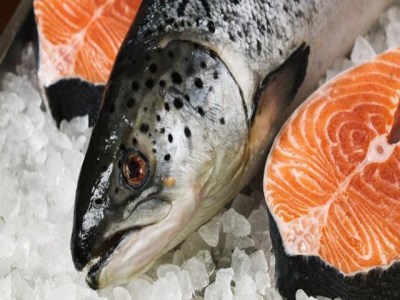Farmed salmon health gets research boost

Two consortia will help in understanding and preventing diseases that affect farmed salmon.
Two research consortia, co-funded by the Scottish Aquaculture Innovation Centre, will explore diseases affecting farmed salmon and how to prevent them, according to an announcement from The Roslin Institute.
One consortium is led by professor Ross Houston at Roslin, together with Dr. Alastair Hamilton of Landcatch Natural Selection, and will analyze the genetic characteristics that cause some salmon to be more vulnerable to sea lice and amoebic gill disease.
The results from this consortium will help the aquaculture industry breed fish with enhanced resilience to parasitic diseases in a more accurate and affordable way by improving a technique known as genomic selection, Roslin said.
The other consortium will explore the factors that can cause gill damage or disease to occur — such as the local environment, water quality and temperatures, as well as nutrition, farming practices and equipment — while also examining how better to prevent and control the condition, Roslin said.
According to the announcement, Scotland is the third-largest producer of salmon in the world based on recent figures from the Scottish government. In 2017, the industry produced 189,707 metric tons and supported around 8,000 jobs across the country, with an overall value of more than £1 billion to the economy.
However, in the last few years, impaired gill health has become a major challenge in an ever-changing natural environment, accounting for substantial losses of fish, the institute said.
"Gill health is up there with sea lice as one of the biggest challenges facing salmon farming not only in Scotland but across all salmon-producing countries. This is an internationally significant issue, which we’re aiming to address through this focused effort from some of the top minds in the field," said Robin Shields, senior aquaculture innovation manager at the Scottish Aquaculture Innovation Centre. “The health of a fish’s gills is absolutely critical to its overall well-being. The outcomes we are looking for from these projects are to help provide the industry with the knowledge and tools it needs to manage and control outbreaks and — further down the line — to prevent disease as far as we can by breeding fish with greater natural resistance."
The projects will bring together the expertise of a range of global businesses and academic institutions, led by Scotland's Rural College; The Roslin Institute; Loch Duart, an independent salmon farming company, and Landcatch Natural Selection, a leading salmon breeding business that is part of Hendrix Genetics. Another 10 organizations will also contribute to the two consortia.
Source: The Roslin Institute, which is solely responsible for the information provided and is wholly owned by the source. Informa Business Media and all its subsidiaries are not responsible for any of the content contained in this information asset.
Có thể bạn quan tâm
 Coated salt supplements may boost fish biomass gain, feed efficiency
Coated salt supplements may boost fish biomass gain, feed efficiency Adding coated forms of sodium butyrate to tilapia feed may boost biomass gain, fish yield and improve feed conversion, say researchers.
 Fish disease guide - Whirling Disease
Fish disease guide - Whirling Disease Whirling disease is a chronic disease caused by Myxobolus cerebralis, a parasitic protozoan that affects mainly juvenile salmonids.
 Fish disease guide - Salmonid Rickettsial Septicaemia
Fish disease guide - Salmonid Rickettsial Septicaemia Salmonid Rickettsial Septicaemia is considered to be the most important disease problem in the Chilean salmon farming industry